6 Tips for Selling on Amazon Handmade

If there’s one thing we know for sure, it’s that you’re the craftiest person on your block. There’s no one who can create your art quite like you, which means the whole world can benefit from your skills. It’s time to amp up your crafting and get the cash you so deserve to roll in. You can start by selling on Amazon Handmade.
The arts and crafts market is booming these days. By 2024, it’s estimated to become a $50.9 billion industry—worth nearly $10 billion more than it is today! Establishing your brand online now, with the help of Amazon Handmade, gives you the chance to claim your share of the market and make it as massive as possible.
We’ll help you sell on Amazon Handmade—successfully—with six tips for setting up a new, professional store.
What Is Amazon Handmade?
Amazon Handmade is a division of Amazon’s ecommerce marketplace that, as the name suggests, focuses on selling handmade goods. It’s fully dedicated to the artisans of the world, giving you a huge platform for the one-of-a-kind products you love to make and want to sell.
The Amazon-owned platform is even more focused on truly handcrafted products than Etsy. Every product on Handmade is entirely made or uniquely altered by hand—no manufacturing partners involved—by a collaborative or team of no more than 20 employees and contractors. Customers can always trust that they’ll receive unique items with a literal personal touch.
If your handmade or hand-altered goods fall within these 14 product categories, you’re already on track to start selling with Amazon:
- Accessories
- Artwork
- Baby
- Beauty & Personal Care
- Clothing, Shoes & Handbags
- Home
- Outdoor & Home Care
- Jewelry & Watches
- Kitchen & Dining
- Pet Supplies
- Sporting Goods
- Stationery
- Party Supplies
- Toys & Games
Why Sell on Amazon Handmade?

Launching an Amazon Handmade shop simplifies the process of selling online. Rather than having to build your own website—which can come with a big learning curve and cost hundreds, even thousands of dollars—you start accepting sales the same day you create your account.
These sales won’t just come from the audience you already have. Amazon Handmade sellers get the perk of a built-in audience. No need to awkwardly hit up all your distant relatives to gain traction. When you sell on Handmade, you can reach millions of Amazon customers who are already loyal to the platform without a massive marketing budget. This means more revenue with limited expenses for you.
Perhaps the best part of Amazon Handmade is the fact that there’s really no risk. The company has continuously waived its $39.99 monthly fee, which is charged to regular Amazon sellers, for Handmade Artisans since 2016. This means there are zero listing fees whatsoever—just a set 15% referral fee when you do make a sale.
How to Set Up a Successful Storefront in 6 Steps
Selling your handmade products on Amazon starts with building a storefront that’s professional, eye-catching, and optimized to be found. Then, when you want to make sure your sales volume grows, you can use smart promotional tactics to get in front of your target audience and make money faster.
Here are six key tips for successfully doing all of the above:
1. Apply to Sell on Amazon Handmade
When you want to sell on Amazon Handmade, you can’t just sign up right away—even if you already have a seller account in the Amazon Marketplace. To ensure the quality of all Handmade items, Amazon requires you to go through a short and simple application process to get approved first.
You can get started by heading to this Handmade sellers page and tapping “Apply Now.”
The form will then help Amazon determine your eligibility by asking about your organization, your production process, and what Handmade category your products would fall under. Make sure to provide a few high-quality pictures to show off your best work! This can include images of your production process, so it’s clear that you’re truly the master crafter behind your art.
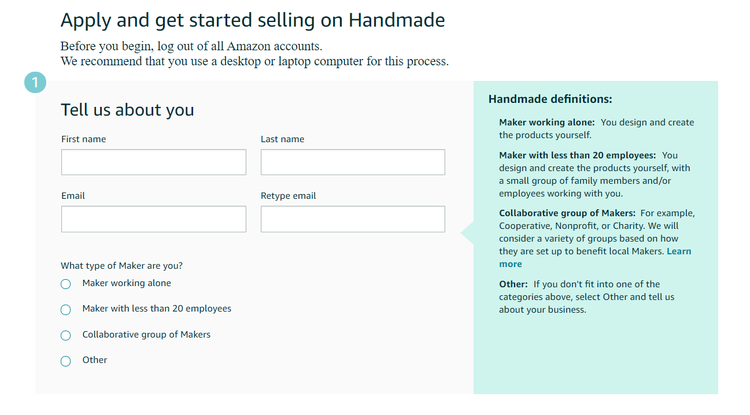
You should hear back with an approval if you qualify within two weeks, though many sellers receive answers within a day or two.
2. Build Your Artisan Profile
Once you’ve officially created your account, you can start building a beautiful storefront that fully represents your brand.
On the Handmade platform, this storefront is known as your Artisan profile or Maker profile. Unlike a traditional Amazon storefront, your Artisan profile gives you the chance to tell your complete, compelling brand story through a number of customizable fields.
You’ll be able to fill in:
- Your store name: This should be your business name. If you don’t already have one, select a concise but unique name that represents who you are and what you do.
- Your preferred URL: Every Amazon Handmade seller gets the perk of a custom short URL that your customer base can easily reach you through. This custom URL will appear as “amazon.com/handmade/[your custom ending]” and should closely align with your store name.
- Your craft: Enter one or a few words that describe your crafting niche. Something like “quilting” or “children’s home decor” can work.
- Your inspiration: Make this a short phrase—no more than a few sentences—about what inspires you to create. Consider your brand purpose when writing this. Why do you exist? This will display as a quote at the top of your Artisan profile, so make your words count.
- Your biography: Using your brand voice, share how you got started with your craft and expand on your inspiration. Showcase what your values are and what makes your brand unique.
- Your production process: This is your chance to showcase the care that goes behind every product you create. Use your brand voice to share where you source your materials and what steps go into making your unique handcrafted goods. The more descriptive the better—but still try to keep it around 150 words or less, so your visitors don’t tune out.
- Your location: You can share your small business’s country and state (if relevant). This is a great way to get found by Amazon shoppers who want to support local or regional artisans.
You can also provide your own first and last name on the backend of your Artisan profile, so customers can see that they’re interacting with a real person when they reach out to you.
In addition to these text fields, you’ll also be able to add a profile picture (200×200 pixels) and cover image (1200×350 pixels). These sit at the very top of your profile, so make sure they accurately reflect your brand and what you do, while being as compelling as possible.
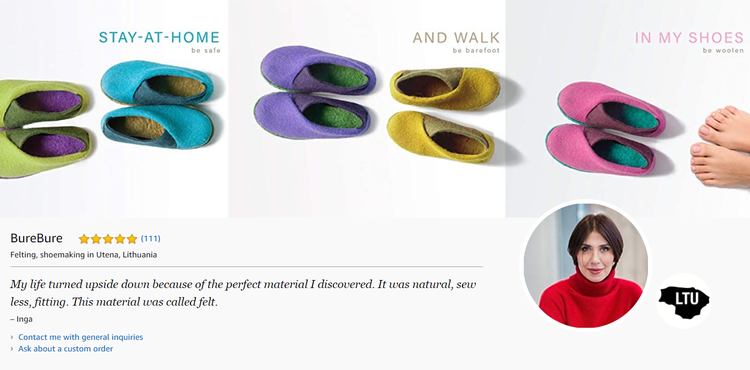
Your profile picture can be your small business’ logo, but Amazon Handmade is actually a platform where showing your beautiful face can really make a difference! Your customers want a one-of-a-kind experience, and that often means connecting with the person who created their handmade product on a personal level.
For your cover image, we recommend giving Handmade shoppers a little more insight into your brand and what you do. For example, you may include a few images of your production process and products. You can use Adobe Express to build the perfect layout for your custom-sized graphic and ensure your final design aligns with your brand style guide.
3. List Your Products
Your Amazon Handmade store is almost fully set up to drive in customers at this point. What’s left is listing the products you plan to sell.
From your Seller Central, just head to your “Inventory” tab and tap “Add a Product” to start creating listings for your handcrafted goods. For every product you list, you’ll get the chance to:
- Select categories and subcategories from a drop-down menu
- Write a title and description
- Select a standard price
- Enter a custom SKU (optional)
- Enter the quantity you have for sale
- Enter your expected production time (including extra time for customizations)
- Enter search terms that Amazon customers may use to find your product
- Upload a set of images
- Provide extra information, like your product weight and materials
- Offer up to 10 customizations, such as sizes or colors
Here are tips to help you maximize some of these fields:
Optimizing Your Product Listings for Search
Filling in every available field on your product listings is already a great start for helping your products get found. When you have related search terms filled in and Handmade categories selected, Amazon will know where your listings should show up, so you can reach the right audience. This also helps with search engine optimization (SEO), so your product pages rank on Google.
However, you can further optimize your titles, descriptions, and search terms to make your handmade items even more searchable.
For your title, stick to a headline that’s under 60 characters and gives an accurate description of your product. This isn’t the place to get punny or push your brand lingo. Think about what customers are searching for first. A title like “Monogrammed Kitchen Towels, 100% Cotton, Chevron Pattern” may not be the coolest title, but it’s what you need to get found.
Your product description gives you the opportunity to stand out a little more. You can use your brand voice to give customers more insight into your product’s unique features, mixing in keywords into your descriptive language. We recommend re-emphasizing that your product is created by you to further distinguish it from non-Handmade items, since not every customer will come straight from the Handmade section of Amazon.
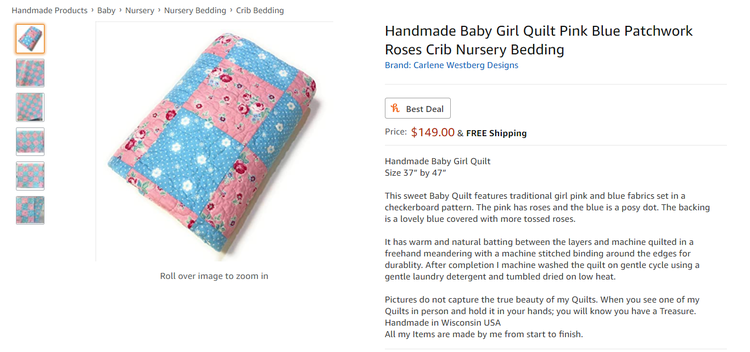
To optimize your search terms, select keywords that are single words (not phrases) and completely relevant to your product. Once again, think about what your customers are searching for.
Choosing the Right Product Image
Your product images can make or break a sale, so it’s extremely important that you’re selecting clear, high-quality photos that make your items look great.
Amazon recommends that your main image—the first one that your customers will see—displays your product on a white background, with no props or watermarks. It should ideally give viewers a complete look at your product.
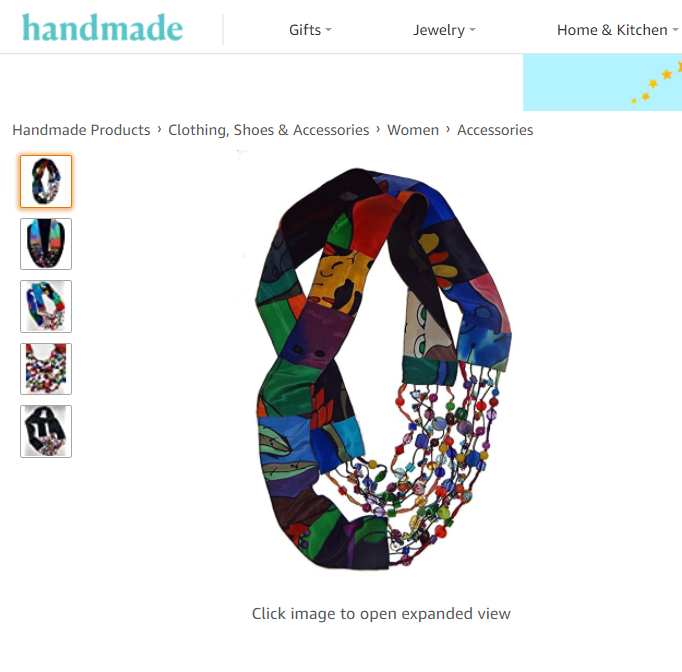
To achieve this look, many professional sellers hire photographers or use studio lighting. However, when you’re just getting started, you can make your product page look good just by investing in a mini photo studio box or taking a photo with good lighting, then using Adobe Express' Remove Background tool to lay your product image on a white background.

https://www.instagram.com/p/CET8PNEg3FQ/
The rest of your photos can then give customers a closer look at your product, including its textures, colors, and size. Square images are ideal. Check out these product images and tap to make them your own.
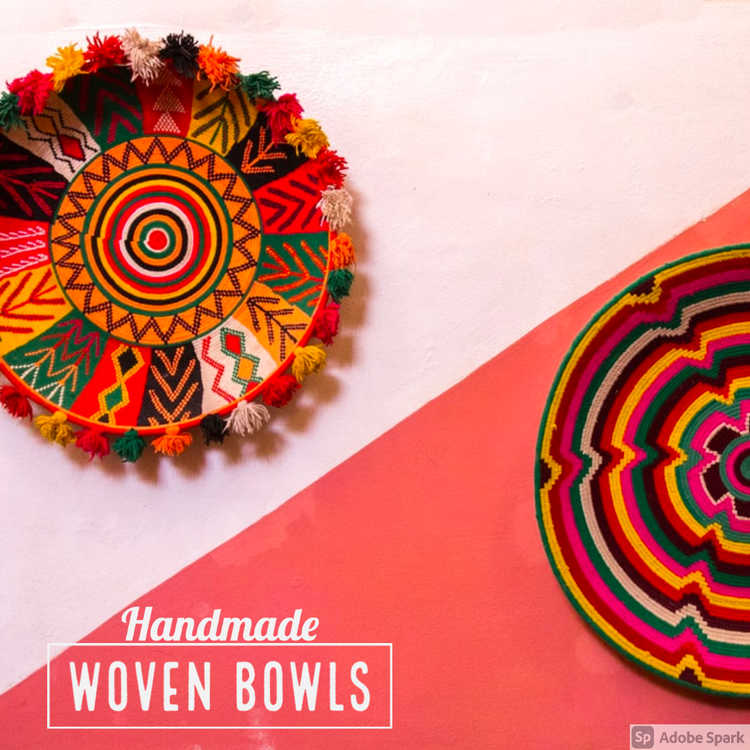
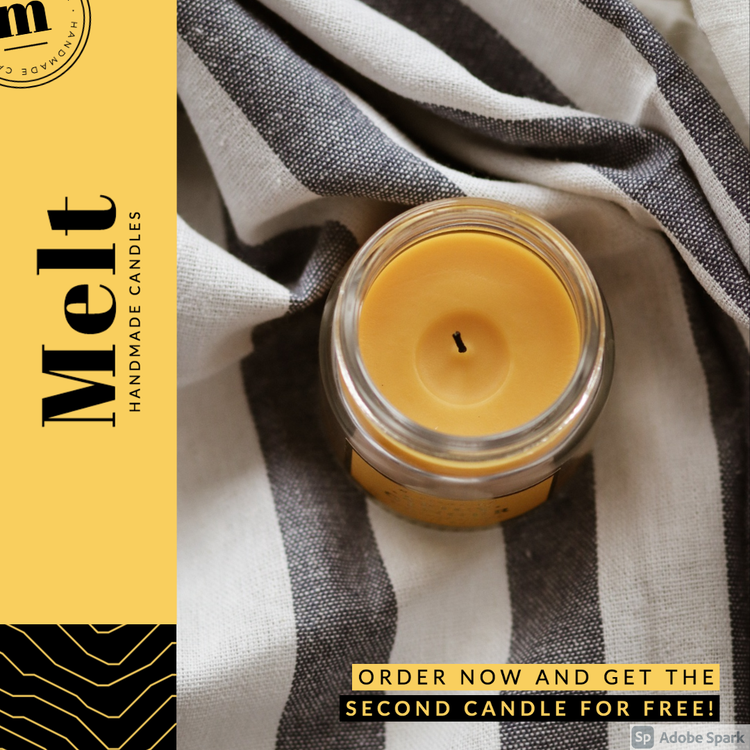
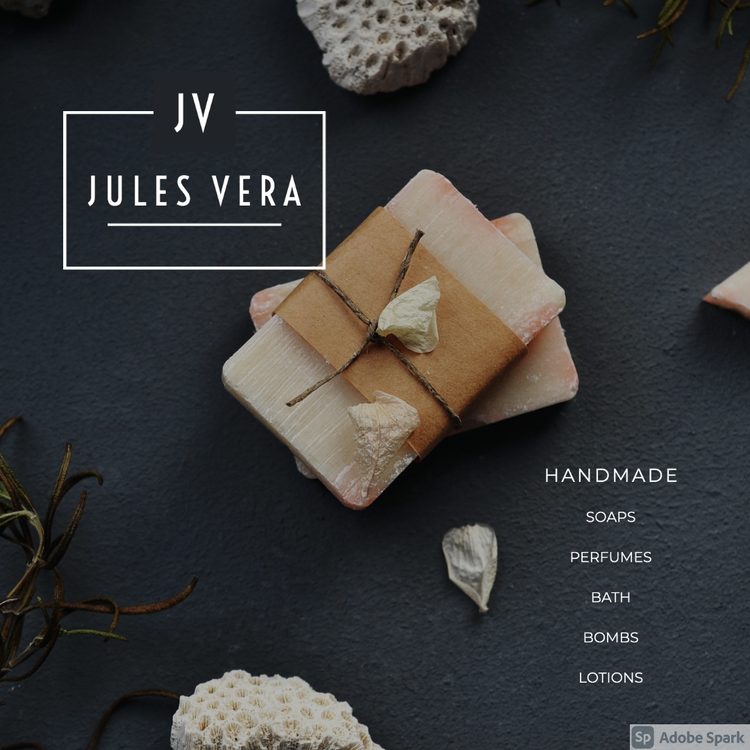
See more Adobe Express templates!
Pricing With Amazon Handmade Fees in Mind
While there are no transaction fees for credit card payments or subscription fees for Handmade, thanks to Amazon’s ongoing monthly fee waiver, you do need to remember that a seller fee—known as a referral fee—still exists.
In the United States, Amazon Handmade’s referral fee is 15% for all products, with a minimum $1 charge per sale.
Calculate this selling fee into your product pricing to ensure it’s covered by your customer’s payment and that your profit margin remains ideal.
Featuring Products on Your Profile
To drive even more sales, you can head back to your Artisan profile to:
- Tag any products displayed on your cover photo, to drive customers straight to your product page.
- Select featured products, perhaps to share seasonal, bestselling, or on-sale products.
4. Share on Social Media
With your Amazon Handmade storefront fully complete, it’s time to market your brand.
Start building your social media presence if you haven’t already, then start sharing posts to promote your new store—always linking back to your custom URL or individual product pages.
Use Adobe Express' social media templates to create stunning graphics to share within minutes and make each one on-brand with the tap of a button.
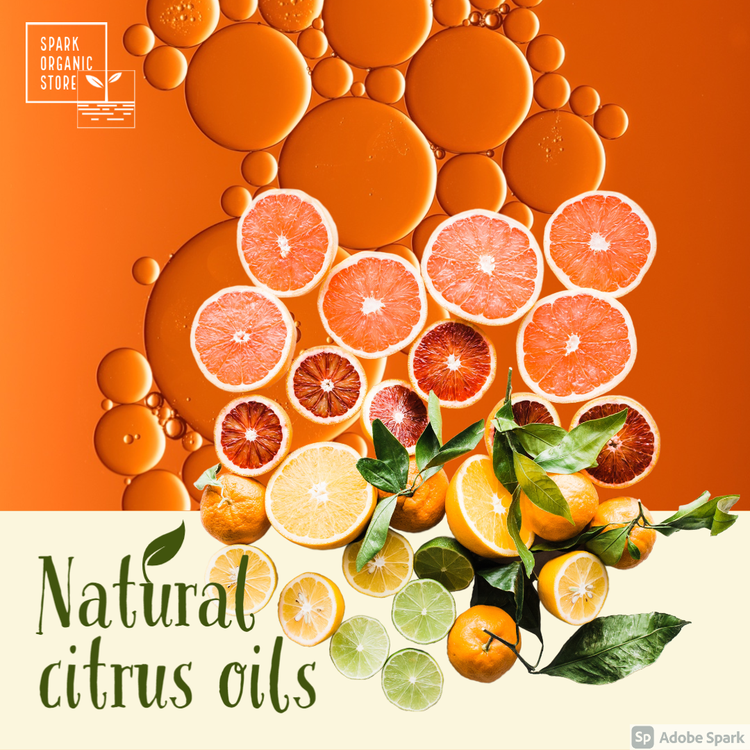
When you have the budget to do so, you can even expand your store’s reach by investing in social media ads, including Instagram and Facebook ads, to drive more traffic to your Handmade store.
See more social media templates for online sellers!
5. Use Sponsored Ads
You aren’t limited to advertising on social media. You can also purchase sponsored ads right on Amazon to get your products or your brand right in front of shoppers who are already interested.
Here’s a look at how sponsored ads can push your products to the very top of a search page on Amazon Handmade:
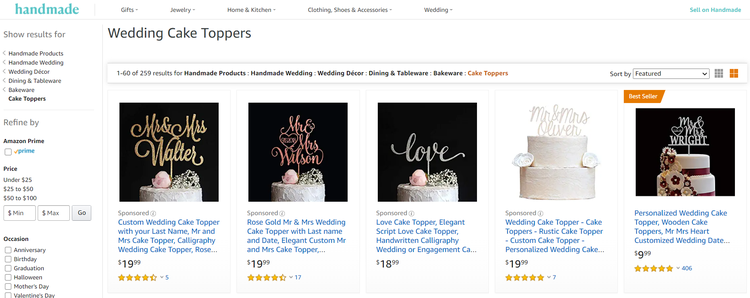
You even have the option to allow Amazon to display your ads outside of the platform, so you can drive in visitors from other areas of the internet, too. As is the case with social media ads, you’ll only pay when you get a click. Plus, you can set your own budget and track metrics that are important to you.
Amazon sellers actually get a whole $50 worth of free clicks just by joining, so make sure you take advantage of this credit for your first campaign.
6. Ask for Reviews
As a final tip, don’t forget to ask for reviews. Reviews are a big part of how Amazon customers shop and can help your Handmade shop build trust with future visitors. The best part is, you can request a review straight from your Seller Central page, so you can streamline this process, which can make your store even more successful.
Five to 30 days after your customer receives your order, just pull up the order details from Seller Central and tap “Request a Review” to get started. Once you confirm your request, your customer will receive an automated request from Amazon—no more work needed on your part.
Setting up and maintaining a successful store on Amazon Handmade is something that truly any crafter can do. Start pursuing your dreams with our tips today!